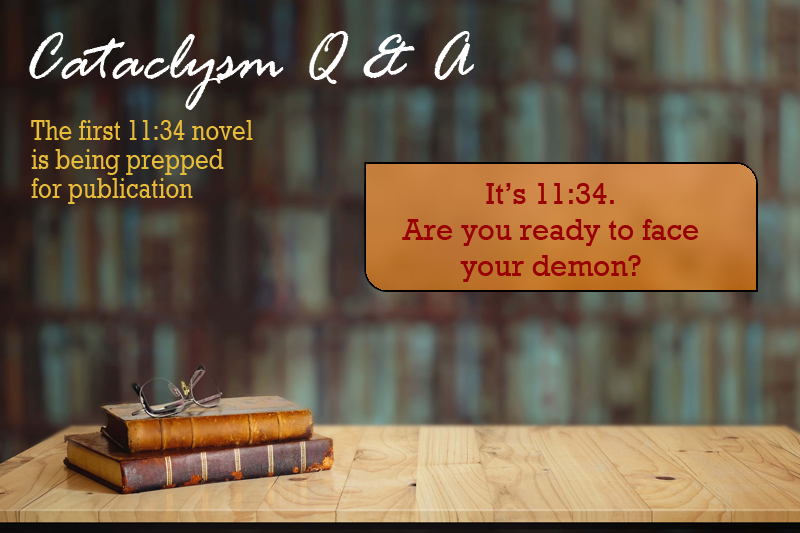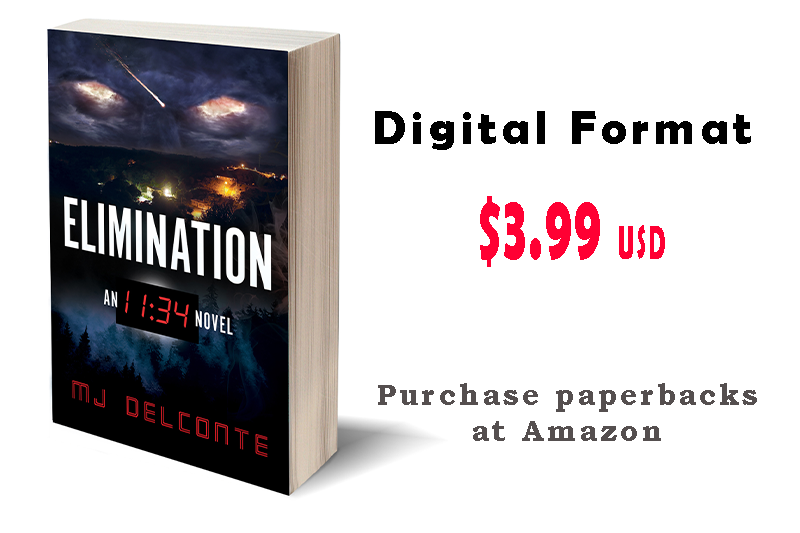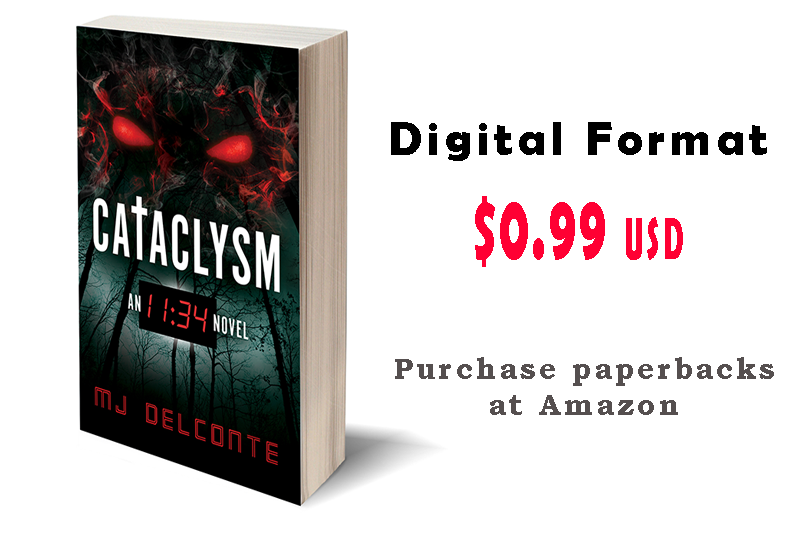
Cataclysm Q & A
Q: What inspired you to write Cataclysm, the first novel of your 11:34 series?
A: A nightmare. Nightmares are a keyhole into the psyche. They find the chink in our armor and exploit it. For that, I guess I am weird because I love nightmares. I awoke at two in the morning after that one fateful nightmare and found myself writing about my nightmare on my home office’s dry erase board until five in the morning. I just couldn’t let it go. Something in me had erupted like a volcano, and there was no way I was getting back to sleep until I wrote it down. What I wrote turned out to be the foundation of the 11:34 series.
Interestingly enough, it was around that time that I sought an artistic outlet. I worked for some lousy management at a university, which drove me to find something that would prevent me from driving myself crazy. Writing a novel was a life aspiration of mine since I was a child. Everything just kind of clicked that night.
Q: Do you normally have nightmares or ones that drive creativity?
A: I rarely have nightmares. When I do, I will write them down – but only if they are solid. Dreams, good or bad, have a knack of leaving an impression. Others are just quite dumb and an absolute waste of time.
Q: Do you like to sleep?
A: No. Not at all. Until I experienced my serious illness last year, I was used to getting by on four hours of sleep a night. I felt sleep got in the way of progress. I’d rather spend my time writing, learning, reading, or studying. Post-illness, I now find myself sleeping at least six hours every night plus naps whenever my body calls for it.
Q: It has been years. Why is it taking so long to publish your novel?
A: The nightmare that became the foundation of 11:34 occurred fifteen years ago. Like any idea, I needed time to work the idea, and over a year or two, I found that this thing had become three-dimensional. It had legs to stand on. That’s when I was truly sold on the idea of writing a novel. So, I researched the hell out of it.
Q: What did you do to prepare yourself to write Cataclysm?
A: No matter how good or bad you feel you are as a writer, what you will hear over and over and over again is you must write. And keep writing. Now, if you want to improve, there are steps writers take on the journey towards success. Some go to school and earn fancy degrees, like MFAs. Others find themselves tired of the career they spent years cultivating, and they will leave their jobs as attorneys, politicians, or whatever to become authors. Me? I spent the past thirty-plus years working in technology. One day, I hope authoring will become my next career.
No matter how you arrive at the point in your life when you decide you want to be a writer or author, it would be in your best interest if you improve your skillset. I read several books on the subject. I used YouTube, Amazon, or any resource made available to stream media, listen to authors’ tales. Multiple sources insisted that you needed to write a million words. You can’t play pro sports without going through training camp and several practices. I wrote my first novel, Deathsword. It stands at 360 pages and has been rewritten eleven times. After that, I spent six months honing my writing skills at Gotham Writer’s Workshop in New York. Then, I revisited Deathsword. It remained a good story, but the writing was awful. So, I wrote several short stories; some I submitted to magazine writing contests. None of them earned any awards, but I found that my writing was improving. I put Deathsword aside for another day, and I began to write the Test of Mettle stories for 11:34. Cataclysm had more traction once it had some meat on its bones. I found myself outlining the series and writing for the second and third novels.
After three rewrites – the third I completed after my long illness this year, Cataclysm was ready.
Q: What steps have you taken after the book was written?
A: Before I can answer that, we need to look at 2019. I thought the novel was ready after the second rewrite. I was sorely mistaken. I peddled the novel to 41 agents, but only 12 responded. Nobody was interested. I began to think that maybe my novel was not ready, wondering what I could do to change that. I did some additional research and contacted a company called Write by Night in New York. I paid them to have my novel professionally critiqued. It was precisely what the novel needed at that time. While the writing was pretty solid, mistakes were made. I cleaned them all up with the third rewrite.
After the third rewrite, what should be my next step? The manuscript is good, but is it ready for publication? I don’t know. After conferring with my wife, she and I decided to go all-in with our chips. I contacted Write by Night again, and now we have a mega plan that involves everything needed to put my novel in the best possible position for publication. We will reach out to twenty agents and twenty publishers, but not until the query letter, bio, synopsis, pitch letter, marketing plan – all of it – is in perfect condition. This also includes having the manuscript professionally proofed and edited. Some publishers will not accept your manuscript unless it has been sanitized.
Q: It sounds like you have a game plan. Would that be an accurate assumption?
A: Absolutely, and I am following my game plan to the letter. If the brick and mortar route fails, then I will e-publish the book. By then, the book will be ready, cleaned, free of mistakes.
Q: You’ve brought that up a few times. What’s your position on having your manuscript professionally proofed and edited?
A: Let’s say you spend a lot of money on groceries to make a meal for a large group of people. But, you choose not to follow a recipe. You just kind of wing it. The end product is something that is okay, but its flaws prevent you from truly enjoying what could have been something great. That’s writing in a nutshell. Why spend hundreds of hours researching and writing something you are passionate about only to watch it flop because you chose not to polish the end result? It’s a travesty. It’s something you see everywhere. There is nothing more discouraging than finding a story that captures your interest, only to find the reviews padded with comments about syntax, grammar, and spelling.
I read a few novels that had not been proofed and edited. Sadly, I found the mistakes entirely too distracting from the story. I stopped reading one such e-book after a few chapters because of the constant errors. I could not get through them; they killed the story for me.
Now, before I purchase an e-book, I skim through the reader’s comments to see if there is a pattern of complaints, then I will not purchase the novel. Let’s be real, too. How many novels written by James Patterson, Stephen King, John Grisham, or any of the other great, successful authors out there have published books loaded with syntax, grammar, and spelling errors? It has got to be pretty close to zero, right? So, my advice is to do what the greats do.
Q: Can you give us a glimpse into your novel writing crystal ball? What do you have planned?
A: If my novels do not draw attention, then what is the point of writing them? I am realistic when I say this: a lot depends on a modicum of success. Should that happen, then I am reaching for the stars. I would love to revisit the Deathsword project. Deathsword was planned to be a three-book epic. I have a few other ideas I have been mulling around. Like 11:34, time will tell if they grow to become something exciting and three-dimensional.
Q: Has working in technology helped you with your writing endeavor?
A: In some ways, yes. I wrote hundreds of technical documents over the years. I’ve also written thousands, if not millions, of lines of code (web pages, scripts, etc.). Writing a story is a bit like writing a program. You have to write it in a particular order, or you risk breaking the flow of the story if part of it out of sequence. If your syntax is incorrect or your code contains spelling errors, it will not work. And nobody wants that.
It’s rare to come across an IT guy or gal who left their career to become an author. You see it quite a bit by those in law. I’d like to be that IT guy who finds success.
Q: Since going back to Write by Night, what, if anything, have you learned about the business?
A: It’s not as easy as simply writing a novel. There is way more to the publishing business than I realized. I did not reach out to publishers last year, so I learned about another scope to peddling your manuscript and how to write your query letter. Last year, I used what they call a “shotgun approach” by shooting my query letter to agent after agent. Mind you, I vetted each one, but I failed to include why they were important and why they would make an ideal agent. If they published a rash of thrillers, then it would have been wise to list these in the query letter. You have to tailor your query letter for each entity to whom it is being sent, so you should include a few lines that rope them in, makes them feel inclusive.
It’s useful for new writers to invest time by educating themselves a little about the business. I researched this long ago, and GWW provided some insight as part of their program, so I did not find myself completely in the dark.
It may explain why authors choose to saturate the market with error-laden e-books. Maybe they don’t want to go through the hassle and expense. I feel this is the lazy way out, but, in the end, it is their creation, so it is their decision. Sales are going to be impacted negatively by going down this rabbit hole. Another tip for new novel writers is to prepare yourself for this.
Q: What else can you tell us about Cataclysm?
A: Well, as I mentioned, the manuscript is in the hands of Write by Night. It is in the process of being professionally proofed and edited. It will take time; this is not the process you want to rush. Meantime, the other components for peddling novels – bio, pitch letter, synopsis – have to be perfected. I’ve written several versions of these, but it is good to have another set of eyes on them. Write by Night is taking care to ensure these will be ready to go, too. I should have the query letter done today – tomorrow at the latest – and will submit that to them for review.
Q: Series are not easy to write. Authors have repeatedly commented about the challenges of maintaining the timeline and knowing every small detail about each of their characters and the events that had taken place. 11:34 is intended to be a series. What is your experience with this?
A: No doubt, this will be a challenge. Not only do I have to contend with timelines, but my series is a set of short stories that occur over 400 years, since the initiation of the Test of Mettle. I cannot possibly have a single protagonist that stands out because no one lives that long. Ergo, I felt it necessary to create several short stories to tie everything together.
The series will be at least three books long, and I’ve been giving the fourth novel some consideration. I wrote out the timeline on a twelve-foot strip of banner paper and pinned it to my wall. It came tumbling down one breezy day, so I need to come up with another solution to track everything that happens. I will also need to be cognizant of all the finite details surrounding the Tests of Mettle because they become significant later in the series.
Q: What can you tell us about the second novel in the series?
A: Technology, the internet, society as a whole… they all play against the Executive, whose organization is feverishly working to locate the Repository, an angelic being who can transform itself into any structure anyplace at any time. When the Final Sin was committed 400 years ago, commencing the Test of Mettle, the Repository was there. And the Executive knows this. But, so does someone else, and they wish to see the Apocalypse through. The Executive is keen on finding the elusive Repository, which has only been located three times in the past 400 years. The tests ratchet up several notches when a former military hero, known as The Doer, is thrust into action, locating the Repository in the process. The Doer now becomes the only human on the planet with the knowledge to end the Apocalypse. Except, Lucifer is watching, waiting, and seething. Lucifer decides to enact the Test of Mettle on the Doer that very evening, at 11:34. Lucifer selects a very special demon to perform the Test of Mettle: himself. If the Doer wins, then he can never be tested again, and the information he carries gives humanity a considerable advantage. Lose, and the information is lost, and Lucifer will claim the Doer’s soul. It will be an epic showdown.
When time permits, I am working on completing the second novel. I would like to have the first draft finished by the end of the year.
Q: You created a trailer for the first novel and hinted at a second trailer. Can you share anything with us?
A: I intend to produce a bigger and badder video. It’s too early to provide details other than I envision something that brings the spirit of the Test of Mettle between Lucifer and the Doer.


